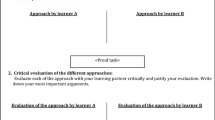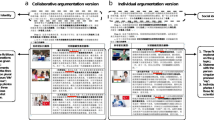Abstract
Collaboration scripts and heuristic worked examples are effective means to scaffold university freshmen’s mathematical argumentation skills. Yet, which collaborative learning processes are responsible for these effects has remained unclear. Learners presumably will gain the most out of collaboration if the collaborators refer to each other’s contributions in a dialectic way (dialectic transactivity). Learners also may refer to each other’s contributions in a dialogic way (dialogic transactivity). Alternatively, learners may not refer to each other’s contributions at all, but still construct knowledge (constructive activities). This article investigates the extent to which constructive activities, dialogic transactivity, and dialectic transactivity generated by either the learner or the learning partner can explain the positive effects of collaboration scripts and heuristic worked examples on the learners’ disposition to use argumentation skills. We conducted a 2 × 2 experiment with the factors collaboration script and heuristic worked examples with N = 101 math teacher students. Results showed that the learners’ engagement in self-generated dialectic transactivity (i.e., responding to the learning partner’s contribution in an argumentative way by critiquing and/or integrating their learning partner’s contributions) mediated the effects of both scaffolds on their disposition to use argumentation skills, whereas partner-generated dialectic transactivity or any other measured collaborative learning activity did not. To support the disposition to use argumentation skills in mathematics, learning environments should thus be designed in a way to help learners display dialectic transactivity. Future research should investigate how learners might better benefit from the dialectic transactivity generated by their learning partners.




Similar content being viewed by others
References
Anderson, J. R. (1996). A simple theory of complex cognition. American Psychologist, 51(4), 355–365. doi:10.1037/0003-066X.51.4.355.
Asterhan, C. S. C., & Schwarz, B. B. (2009). Argumentation and explanation in conceptual change: Indications from protocol analyses of peer-to-peer dialog. Cognitive Science, 33(3), 374–400. doi:10.1111/j.1551-6709.2009.01017.x.
Atkinson, R. K., Derry, S. J., Renkl, A., & Wortham, D. (2000). Learning from examples: Instructional principles from the worked examples research. Review of Educational Research, 70(2), 181–214. doi:10.3102/00346543070002181.
Boero, P. (1999). Argumentation and mathematical proof: A complex, productive, unavoidable relationship in mathematics and mathematics education. Preuve: International Newsletter on the Teaching and Learning of Mathematical Proof, (July/August 1999). Retrieved from http://www.lettredelapreuve.it/OldPreuve/Newsletter/990708Theme/990708ThemeUK.html.
Chi, M. T. H. (2009). Active–constructive–interactive: A conceptual framework for differentiating learning activities. Topics in Cognitive Science, 1(1), 73–105. doi:10.1111/j.1756-8765.2008.01005.x.
Chi, M. T. H., Roy, M., & Hausmann, R. G. M. (2008). Observing tutorial dialogues collaboratively: Insights about human tutoring effectiveness from vicarious learning. Cognitive Science, 32(2), 301–341. doi:10.1080/03640210701863396.
Chi, M. T. H., & Wylie, R. (2014). The ICAP framework: Linking cognitive engagement to active learning outcomes. Educational Psychologist, 49(4), 219–243. doi:10.1080/00461520.2014.965823.
Choi, I., Land, S. M., & Turgeon, A. J. (2005). Scaffolding peer-questioning strategies to facilitate metacognition during online small group discussion. Instructional Science, 33(5–6), 483–511. doi:10.1007/s11251-005-1277-4.
Clark, D. B., & Sampson, V. D. (2007). Personally seeded discussions to scaffold online argumentation. International Journal of Science Education, 29(3), 253–277. doi:10.1080/09500690600560944.
Cress, U. (2008). The need for considering multilevel analysis in CSCL research—An appeal for the use of more advanced statistical methods. International Journal of Computer-Supported Collaborative Learning, 3(1), 69–84. doi:10.1007/s11412-007-9032-2.
De Vries, E., Lund, K., & Baker, M. (2002). Computer-mediated epistemic dialogue: Explanation and argumentation as vehicles for understanding scientific notions. The Journal of the Learning Sciences, 11(1), 63–103. doi:10.1207/S15327809JLS1101_3.
De Wever, B., Van Keer, H., Schellens, T., & Valcke, M. (2010). Structuring asynchronous discussion groups: Comparing scripting by assigning roles with regulation by cross-age peer tutors. Learning and Instruction, 20(5), 349–360. doi:10.1016/j.learninstruc.2009.03.001.
Dillenbourg, P., & Hong, F. (2008). The mechanics of CSCL macro scripts. International Journal of Computer-Supported Collaborative Learning, 3(1), 5–23. doi:10.1007/s11412-007-9033-1.
Ertl, B., Kopp, B., & Mandl, H. (2006). Fostering collaborative knowledge construction in case-based learning in videoconferencing. Journal of Educational Computing Research, 35(4), 377–397. doi:10.2190/A0LP-482N-0063-J480.
Fischer, F., Kollar, I., Stegmann, K., & Wecker, C. (2013). Toward a script theory of guidance in computer-supported collaborative learning. Educational Psychologist, 48(1), 56–66. doi:10.1080/00461520.2012.748005.
Forman, E. A., Larreamendy-Joerns, J., Stein, M. K., & Brown, C. A. (1998). “You’re going to want to find out which and prove it”: Collective argumentation in a mathematics classroom. Learning and Instruction, 8(6), 527–548. doi:10.1016/S0959-4752(98)00033-4.
Hayes, A. F., & Preacher, K. J. (2014). Statistical mediation analysis with a multicategorical independent variable. British Journal of Mathematical and Statistical Psychology, 67(3), 451–470. doi:10.1111/bmsp.12028.
Heinze, A., Reiss, K., & Rudolph, F. (2005). Mathematics achievement and interest in mathematics from a differential perspective. ZDM The International Journal on Mathematics Education, 37(3), 212–220. doi:10.1007/s11858-005-0011-7.
Hilbert, T. S., Renkl, A., Kessler, S., & Reiss, K. (2008). Learning to prove in geometry: Learning from heuristic examples and how it can be supported. Learning and Instruction, 18(1), 54–65. doi:10.1016/j.learninstruc.2006.10.008.
Hron, A., Cress, U., Hammer, K., & Friedrich, H. F. (2007). Fostering collaborative knowledge construction in a video-based learning setting: Effects of a shared workspace and content-specific graphical representation. British Journal of Educational Technology, 38(2), 236–248. doi:10.1111/j.1467-8535.2006.00619.x.
Hron, A., Hesse, F. W., Cress, U., & Giovis, C. (2000). Implicit and explicit dialogue structuring in virtual learning groups. British Journal of Educational Psychology, 70(4), 53–64. doi:10.1348/000709900157967.
Ismail, H. N., & Alexander, J. M. (2005). Learning within scripted and nonscripted peer-tutoring sessions: The Malaysian context. The Journal of Educational Research, 99(2), 67–77. doi:10.3200/JOER.99.2.67-77.
Jiménez-Aleixandre, M. P., Bugallo Rodríguez, A., & Duschl, R. A. (2000). “Doing the lesson” or “doing science”: Argument in high school genetics. Science Education, 84(6), 757–792. doi:10.1002/1098-237X(200011)84:6<757:AID-SCE5>3.0.CO;2-F.
King, A. (1997). ASK to THINK-TEL WHY: A model of transactive peer tutoring for scaffolding higher level complex learning. Educational Psychologist, 32(4), 221–235. doi:10.1207/s15326985ep3204_3.
King, A. (2007). Scripting collaborative learning processes: A cognitive perspective. In F. Fischer, I. Kollar, H. Mandl, & J. M. Haake (Eds.), Scripting computer-supported collaborative learning—Cognitive, computational, and educational perspectives (pp. 13–37). New York, NY: Springer.
Kollar, I., Fischer, F., & Hesse, F. W. (2006). Collaboration scripts—A conceptual analysis. Educational Psychology Review, 18(2), 159–185. doi:10.1007/s10648-006-9007-2.
Kollar, I., Ufer, S., Reichersdorfer, E., Vogel, F., Fischer, F., & Reiss, K. (2014). Effects of collaboration scripts and heuristic worked examples on the acquisition of mathematical argumentation skills of teacher students with different levels of prior achievement. Learning and Instruction, 32(1), 22–36. doi:10.1016/j.learninstruc.2014.01.003.
Kopp, B., & Mandl, H. (2011). Fostering argument justification using collaboration scripts and content schemes. Learning & Instruction, 21(5), 636–649. doi:10.1016/j.learninstruc.2011.02.001.
Kuhn, D., & Crowell, A. (2011). Dialogic argumentation as a vehicle for developing young adolescents’ thinking. Psychological Science, 22(4), 545–552. doi:10.1177/0956797611402512.
Leitão, S. (2000). The potential of argument in knowledge building. Human Development, 43(6), 332–360. doi:10.1159/000022695.
Molinari, G., Sangin, M., Dillenbourg, P., & Nüssli, M.-A. (2009). Knowledge interdependence with the partner, accuracy of mutual knowledge model and computer-supported collaborative learning. European Journal of Psychology of Education, 24(2), 129–144. doi:10.1007/BF03173006.
National Council of Teachers of Mathematics (Ed.). (2000). Principles and standards for school mathematics. Reston, VA: NCTM.
Noroozi, O., Biemans, H. J. A., Weinberger, A., Mulder, M., & Chizari, M. (2013). Scripting for construction of a transactive memory system in a multidisciplinary CSCL environment. Learning & Instruction, 25, 1–12. doi:10.1016/j.learninstruc.2012.10.002.
Noroozi, O., Weinberger, A., Biemans, H. J. A., Mulder, M., & Chizari, M. (2012). Argumentation-based computer supported collaborative learning (ABCSCL). A systematic review and synthesis of fifteen years of research. Educational Research Review, 7(2), 79–106. doi:10.1016/j.edurev.2011.11.006.
Paas, F. G. W. C., & van Merriënboer, J. J. G. (1994). Variability of worked examples and transfer of geometrical problem-solving skills: A cognitive-load approach. Journal of Educational Psychology, 86(1), 122–133. doi:10.1037/0022-0663.86.1.122.
Pease, A., Smaill, A., Colton, S., & Lee, J. (2009). Bridging the gap between argumentation theory and the philosophy of mathematics. Foundation of Science, 14(1–2), 111–135. doi:10.1007/s10699-008-9150-y.
Preacher, K. J., & Hayes, A. F. (2004). SPSS and SAS procedures for estimating indirect effects in simple mediation models. Behavior Research Methods, Instruments, & Computers, 36(4), 717–731. doi:10.3758/BF03206553.
Reiss, K. M., Heinze, A., Renkl, A., & Groß, C. (2008). Reasoning and proof in geometry: Effects of a learning environment based on heuristic worked-out examples. ZDM The International Journal on Mathematics Education, 40(3), 455–467. doi:10.1007/s11858-008-0105-0.
Reiss, K., & Renkl, A. (2002). Learning to prove: The idea of heuristic examples. ZDM The International Journal on Mathematics Education, 34(1), 29–35. doi:10.1007/BF02655690.
Sadler, T. D. (2004). Informal reasoning regarding socioscientific issues: A critical review of research. Journal of Research in Science Teaching, 41(5), 513–536. doi:10.1002/tea.20009.
Scheuer, O., McLaren, B., Weinberger, A., & Niebuhr, S. (2013). Promoting critical, elaborative discussions through a collaboration script and argument diagrams. Instructional Science, 42(2), 127–157. doi:10.1007/s11251-013-9274-5.
Schwarz, B. B., & Linchevski, L. (2007). The role of task design and argumentation in cognitive development during peer interaction: The case of proportional reasoning. Learning and Instruction, 17(5), 510–531. doi:10.1016/j.learninstruc.2007.09.009.
Schwarz, B., Schur, Y., Pensso, H., & Tayer, N. (2011). Perspective taking and synchronous argumentation for learning the day/night cycle. International Journal of Computer-Supported Collaborative Learning, 6(1), 113–138. doi:10.1007/s11412-010-9100-x.
Stegmann, K., Wecker, C., Weinberger, A., & Fischer, F. (2012). Collaborative argumentation and cognitive elaboration in a computer-supported collaborative learning environment. Instructional Science, 40(2), 297–323. doi:10.1007/s11251-011-9174-5.
Strijbos, J. W., Martens, R. L., Jochems, W. M. G., & Broers, N. J. (2004). The effect of functional roles on group efficiency: Using multilevel modeling and content analysis to investigate computer-supported collaboration in small groups. Small Group Research, 35(2), 195–229. doi:10.1177/1046496403260843.
Teasley, S. D. (1997). Talking about reasoning: How important is the peer in peer collaboration? In L. B. Resnick, R. Säljö, C. Pontecorvo, & B. Burge (Eds.), Discourse, tools, and reasoning: Situated cognition and technologically supported environments (pp. 361–384). Berlin: Springer.
Thurston, W. P. (1994). On proof and progress in mathematics. Bulletin of the American Mathematical Society, 30(2), 161–177. doi:10.1090/S0273-0979-1994-00502-6.
Toulmin, S. (1958). The uses of argument. Cambridge: Cambridge University Press.
van Gog, T., & Rummel, N. (2010). Example-based learning: Integrating cognitive and social-cognitive research perspectives. Educational Psychology Review, 22(2), 155–174. doi:10.1007/s10648-010-9134-7.
Vogel, F., Wecker, C., Kollar, I., & Fischer, F. (2016). Socio-cognitive scaffolding with computer-supported collaboration scripts: A meta-analysis. Educational Psychology Review. doi:10.1007/s10648-016-9361-7.
Wecker, C., Kollar, I., & Fischer, F. (2011). Explaining the effects of continuous and faded scripts on online search skills: The role of collaborative strategy practice. In H. Spada, G. Stahl, N. Miyake, & N. Law (Eds.), Connecting computer-supported collaborative learning to policy and practice: CSCL 2011 conference proceedings. Volume I—Long papers (pp. 390–397). International Society of the Learning Sciences.
Wegerif, R. (2008). Dialogic or dialectic? The significance of ontological assumptions in research on educational dialogue. British Educational Research Journal, 34(3), 347–361. doi:10.1080/01411920701532228.
Weinberger, A., Stegmann, K., & Fischer, F. (2010). Learning to argue online: Scripted groups surpass individuals (unscripted groups do not). Computers in Human Behavior, 26(4), 506–515. doi:10.1016/j.chb.2009.08.0.
Acknowledgments
This research is part of the project ELK-Math, funded by the Deutsche Forschungsgemeinschaft (DFG) under grant RE 1247/9-1 and FI 792/7-1. This contribution contains work that is part of the doctoral dissertation of Freydis Vogel under the supervision of Prof. Dr. Frank Fischer and Prof. Dr. Ingo Kollar.
Author information
Authors and Affiliations
Corresponding author
Rights and permissions
About this article
Cite this article
Vogel, F., Kollar, I., Ufer, S. et al. Developing argumentation skills in mathematics through computer-supported collaborative learning: the role of transactivity. Instr Sci 44, 477–500 (2016). https://doi.org/10.1007/s11251-016-9380-2
Received:
Accepted:
Published:
Issue Date:
DOI: https://doi.org/10.1007/s11251-016-9380-2




